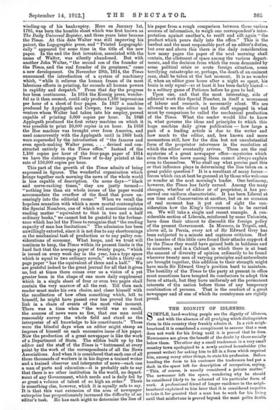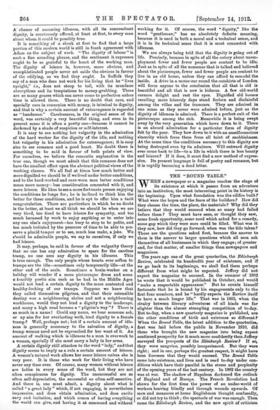THE DIGNITY OF IDLENESS.
QIMPLE, bard-working people see the dignity of idleness,
and with the absence of all grudging which distinguishes them in this country they frankly admire it. In a rich neigh- bourhood it is considered a compliment to assume that a man does not work for his living until it is proved that he does. Newcomers are given the benefit of the doubt by those socially below them. The other day a small tradesman in a very small country town apologized to a. newly arrived householder (the present writer) for asking him to RI in a form which required him, among many other things, to state his profession. Before handing the form to his customer the tradesman bad put a dash in the space- left for description of occupation, saying, "This, of course, is usually considered a private matter." The newcomer left the space, wondering why he should be considered likely to be ashamed of his particular form of work. A professional friend of longer residence in the neigh- bourhood explained to him later that it is considered impolite to take it for granted that a man has to work for his living until that misfortune is proved beyond. the most polite doubt;
A" chance of assuming idleness, with all its concomitant dignity, is courteously offered, at least at first, to every man about whom it could be possibly true.
It is something of a shock at first to find that a large portion of this modern world is still in frank agreement with Adam on the subject of work. "The dignity of labour" is such a fine sounding phrase, and the sentiment it expresses ought to be so grateful to the heart of the working man. The dignity of leisure is, however, more obvious, and unsophisticated people never set aside the obvious in favour of the edifying, as we feel they ought. In Suffolk they say of a man who does not work for his living that he "lives upright," i.e., does not stoop to toil, with its mundane absorptions and its temptations to money-grubbing. There are so many graces which can never come to perfection unless time is allowed them. There is no doubt that care, and specially care in connexion with money, is inimical to dignity, and that is why a certain amount of extravagance is regarded as "handsome." Carelessness, in the original sense of the word, was certainly a very beautiful thing, and even in its present sense it is often a pretty one—because it cannot be darkened by a shade of suspicion or self-interest.
It is easy to see nothing but vulgarity in the admiration of the hard worker for the dignity of the idle, and nothing but vulgarity in his admiration for extravagance; it is easy also to see romance and a good heart. No doubt there is something to be said in favour of both points of view. For ourselves, we believe the romantic explanation is the true one, though we must admit that this romance does not have the smallest effect upon the abstract political views of the working classes. We all feel at times how much better and more dignified we should be if we lived under better conditions, and to the bard-worked and care-worn man better conditions mean more money—less consideration connected with it, and more leisure. He likes to see a more fortunate person enjoying the conditions he longs for ; he is inclined to think him the better for those conditions, and he is apt to offer him a tacit congratulation. There are particulars in which he no doubt is the better, at least we all think we should be when we are very tired, too tired to have leisure for sympathy, and too much harassed by work to enjoy anything or to enter into any one else's enjoyment—too busy to stop to be polite, and too much irritated by the pressure of time to be able to pre- serve a placid temper or to see, much less make, a joke. We ationld be admirable people, we say to ourselves, if only we had leisure.
It may, perhaps, be said in favour of the vulgarity theory that no one has any admiration to spare for the careless tramp, no one sees any dignity in his idleness. This is true enough. The only people whose hearts ever soften to tramps are the idle—sometimes only temporarily idle—at the other end of the scale. Sometimes a brain-worker on a. holiday will wonder if a more picturesque dress and some o.tensibly poetic aim such as he had in the Middle Ages would not lend a certain dignity to the more contented and healthy-looking of our tramps. Suppose we knew that they called themselves pilgrims, and that their ostensible destiny was a neighbouring shrine and not a neighbouring workhouse, would they not lend a dignity to the landscape, and many a high road become a "pilgrim's way "P There is so much in a name ! Could any name, we hear someone ask, or ny aim for her everlasting walk, lend dignity to a female tramp ? Well, perhaps not ; but if a certain amount of idle- ness is generally necessary to the salvation of dignity, a tramp woman need not be reproached for her want of it. An amount of walking which is idleness to a man is overwork to a woman, specially if she must carry a baby in her arms.
A certain dignity still attaches to the word "lady," and that dignity seems to imply as a rule a certain amount of leisure. A woman's natural work allows her some leisure unless she is very poor. It is those who work for their living who have never any time over. Of course, many women without leisure are ladies in every sense of the word, but they are not often conspicuous for dignity. The unsuccessful are so often self-depreciative, the successful so often self-assertive. And there is, one must admit, a dignity about what is called "a great lady" which, if not engaging, is nevertheless impressive, and does obtain admiration, and does excite envy and imitation, and which comes of having everything the world can give, and having it at command and without
working for it. Of course, the word "dignity," like the word "gentleman," has no absolutely definite meaning, because it is used in both a moral and a technical sense, and it is in its technical sense that it is most connected with idleness.
We are always being told that the dignity is going out of life. Precisely, because in spite of all the outcry about unem- ployment fewer and fewer people are content to be idle. Just as in spite of all the nonsense that is talked and believed about the picturesque, fewer and fewer people are content to live in an old house, unless they can afford to remodel the inside. A drive in a motor-car round the outskirts of London will force anyone to the conclusion that all that is old is beautiful and all that is new is hideous. A few old-world corners delight and rest the eyes. Dignified old houses recalling more leisurely days stand forlorn and disdainful among the villas and the tramcars. They are admired in one sense as they never were admired before, just as the dignity of idleness is admired. There is a perfect cult of the picturesque among the rich. Meanwhile it is being swept away by the very generation which bows down to it. There is an absurd admiration for a particular form of dignity felt by the poor. They bow down to it with an unselfconscious sincerity which frees them from all taint of snobbishness: At the same time the conditions necessary to this dignity are being destroyed even by its admirers. Will outward dignity ever come back to life—to a life in which there is less beauty and leisure P If it does, it must find a new method of expres- sion. Its present language is full of poetry and romance, but it is rapidly becoming a dead letter.







































 Previous page
Previous page